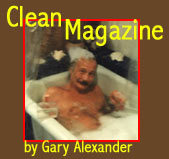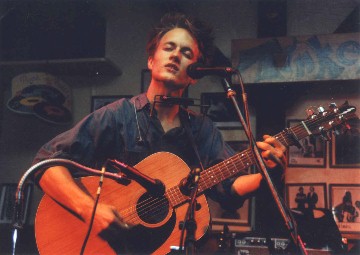 Triumph of the Exile
Triumph of the Exile
Story by Gary Alexander
Photos by Ray G. Ring IV
A Dazzling New Clayton Denwood CD Delivers on
a Long-Anticipated Promise
Before
a trapdoor opened and Clayton Denwood vanished from town as
suddenly as he had first appeared, he had been identified, during the
prior seven years, as a "Woodstock Musician."
Long familiar on the local scene and in a number of Manhattan
musical venues as an extraordinary writer and singer of songs, his
appearances in clubs and at concerts, solo or in company, marked him in
our minds as a regional artist of considerable ability. Everyone, of
course, knew that on a mandatory New World Order National ID card, his
nationality would be listed as "Canadian" but we thought as little of
that small detail as, apparently, did he. If you're in Woodstock long
enough, what does it matter if you're from Brooklyn, Kansas or Canada?
Woodstock Nation has its own imaginary national ID cards, doesn't it?
Nowadays, an ID card or a bank card can also serve as a disguise.
It once was that a supermarket clerk could take a measure of someone by
how they folded their money. Are the big bills on the inside or outside?
If they come out of pocket jumbled into origami puzzles, the bearer is a
poet, musician, artist, drunk or from some other existentially-inflicted
state.
 In Clayton's case, the artist's existential dilemma was nurtured
and conditioned by Woodstock's matter-of-factly, day-to-day,
note-by-note creative preoccupations. Always a new song coming; always a
shift in schedule to make room to play an emergency community benefit or
join a jam that was forming as swiftly as a weather front. Details like
"origins" were continually flooded away by details of "now."
In Clayton's case, the artist's existential dilemma was nurtured
and conditioned by Woodstock's matter-of-factly, day-to-day,
note-by-note creative preoccupations. Always a new song coming; always a
shift in schedule to make room to play an emergency community benefit or
join a jam that was forming as swiftly as a weather front. Details like
"origins" were continually flooded away by details of "now."
"Probably, for me, Woodstock is a place where every day has its
own quality to it," Denwood said recently in a phone call from Toronto.
"Being a small town, when you walk out the door, you're going to see
someone you know...which can change the course of the day. So, your
script is pretty much unwritten."
Denwood allows that similar diversions can happen in cities as
well, particularly along well-beaten cultural and occupational paths.
But, for all of its bustling population and professional comrades, he
finds the city lonelier and more isolating than the Woodstock he
remembers. He finds himself reflecting upon the beauty of the town, its
mountains and streams- "...a haven, in its own way, from the world," he
sighs.
 Although his ancestral roots are somewhat tangled in American
soil, the Denwood line had returned to England before his father's
generation and Clayton himself was Canadian born. He can recall Beatles,
Beachboys and other standard musical fare of the '70's in his earliest
memories of home life and a small piano he began playing at eight when
his family moved to Chicago and inherited it as a piece of left-behind
furniture from a former tenant. The adopted piano remained in the
household and under Clayton's fingers when the family returned to
Canada.
Although his ancestral roots are somewhat tangled in American
soil, the Denwood line had returned to England before his father's
generation and Clayton himself was Canadian born. He can recall Beatles,
Beachboys and other standard musical fare of the '70's in his earliest
memories of home life and a small piano he began playing at eight when
his family moved to Chicago and inherited it as a piece of left-behind
furniture from a former tenant. The adopted piano remained in the
household and under Clayton's fingers when the family returned to
Canada.
Around the time the compact disk debuted, Denwood recalls
finding a horizon-widening treasury of vinyl LPS in milk crates
discarded by a neighbor. In roughly the same period, he followed a
12-year-old's urge to drums and a high school era band. By 15, he had
picked up a guitar and, within a year, started writing "little piano
songs." From there, it was just a matter of time before he outgrew his
role in the band and decided to form his own group in Toronto.
A decision to study in Montreal led to distraction, as he
remembers: "This was the first time I had an apartment. I had a big, old
Underwood typewriter there and I just spent most of my time writing. I
didn't concentrate too much on school and, by the time winter exams came
around, I remember sitting for a world politics test...about ten minutes
into it I just folded it up, walked out and never went back. Spring of
the next year, I left Montreal and came to Woodstock."
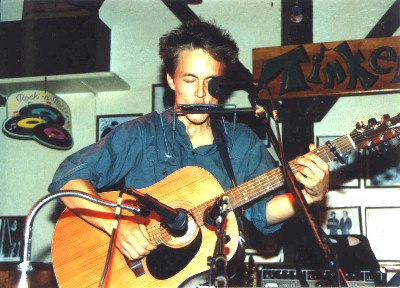 This was early 1992 and, actually, Denwood's sites were drawn
on Greenwich Village but the magnetic lure of this little town had
rubbed into him through books, magazines and legend just as it had the
unknown driver who had picked him up hitchhiking south in Vermont.
This was early 1992 and, actually, Denwood's sites were drawn
on Greenwich Village but the magnetic lure of this little town had
rubbed into him through books, magazines and legend just as it had the
unknown driver who had picked him up hitchhiking south in Vermont.
"You know, I've always wanted to see Big Pink, myself," this
fellow admitted in the middle of a conversation about Woodstock's
musical legacy. He was referring, of course, to the world-renowned
little house tucked away off of a minor road in Saugerties, pictured on
the back of the first album by The Band and recording site for most of
the legendary "Basement Tapes" they rolled off with Bob Dylan. That
called for an impulse exit from the Thruway and a fruitless search
around Saugerties before Denwood's driver gave up and deposited the
musician at the bridge near Tinker Street Cafe.
It would take him, Denwood recalls, "about a year" to find
Big Pink but he immediately found a scene in Woodstock which intrigued
him. Talent abounded in local artists such as Judy Whitfield, Paul
McMahon and numerous other performers and, at the time, as he recalls,
"Hothouse Flowers were in town making a record. So was Natalie Merchant
and other folks. It just seemed like a good place to be for a little
bit."
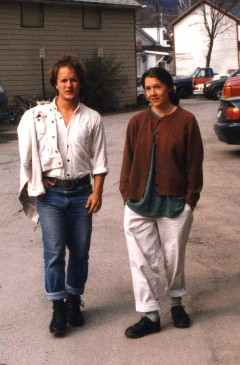 Within days, Denwood had electrified the crowd at the Cafe's
"open mike night" and word circulated swiftly that there was a "New
Dylan" in town. He continued creating a sensation in subsequent
appearances. For one thing, he was just too young to be that good.
Within days, Denwood had electrified the crowd at the Cafe's
"open mike night" and word circulated swiftly that there was a "New
Dylan" in town. He continued creating a sensation in subsequent
appearances. For one thing, he was just too young to be that good.
Many of you know the story from there. Clayton stayed,
working hard at his craft, producing gem after newly-written gem for the
performances he polished zestfully as he strove to live up to that "New
Dylan" image. It was an unfair label which invariably disappointed but,
in Denwood's case, unavoidable.
Even as his musical acumen grew, his presence and poise-
his songs and delivery- his natural style and manner remained distinctly
Dylansque. His onstage intensity was an adhesion to seize audiences and
his voice, even at its most raw moments markedly better than Dylan's own
- with perhaps a hint of Jimmy LaFave tonality- was progressively
untethering its melodic binds and expanding its grasp of subtleties. The
flashes of power in his songs forecast enough promise to anticipate some
true masterpieces down the line and he even had the opportunity to play
with members of The Band who left that fork in his road.
Denwood settled in, picking up odd jobs between gigs to
keep just enough of those crumpled bills in his pocket to make due as he
focused on the next tune. Along the way he married a lass from Columbia
County and fathered a son he wanted to bring to Toronto to meet his
grandparents. There wasn't a second thought that a simple trip north
could lead to the complications which have made him an exile from his
adopted hometown.
"Originally, I was quite insulted and indignant," Denwood
said of that frozen moment border guards blocked his return to the
United States. "Why would you do something like that to me? I can't
remember the official charge exactly- that I lived there and worked
without letting anyone official know or something like that- I'm not too
involved with the government or anything- I've got the papers on file.
It wasn't a tax thing. I think what they were most pissed off at,
basically, was that I didn't pay attention to the rules. I just did my
own thing."
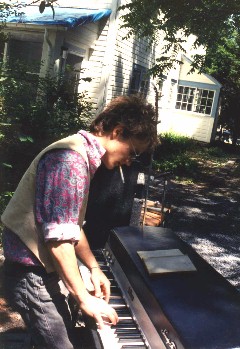 Barred from entry for five years, Clayton will not be
eligible to return until August 19, 2004- two days before his 34th
birthday. In the meanwhile, he gathered a band of crackerjack Canadian
players, recorded his first album live at Toronto's Old York club and
issued it as "The Exile Sessions." A soaring blast of
rock-away-your-blues originals served with self-possessed authenticity.
Barred from entry for five years, Clayton will not be
eligible to return until August 19, 2004- two days before his 34th
birthday. In the meanwhile, he gathered a band of crackerjack Canadian
players, recorded his first album live at Toronto's Old York club and
issued it as "The Exile Sessions." A soaring blast of
rock-away-your-blues originals served with self-possessed authenticity.

Sunset on the Highway |
More recently, Denwood's first studio album, "Sunset on
the Highway," produced by popular Canadian guitarist Joe Dunphy, emerged
as even more of a stunner. Melodically matured and absent the occasional
arm wrestle between lyric and melody which slowed a few of Denwood's
earlier works, here, an internal consistency is at ease with the mating
as lyrics provide opaque tricks and truths with the unpretentious code
of a righteous seeker. Master Dylan could well have written Denwood's
opening track, "Only You," during one of his endless phases of self-
reinvention. But he didn't and, for all of its Dylansque quality,
Clayton claims it as pure Denwood.
On "Make Me Whole," Denwood finds some of his own doors to the
secret garden and seems to reflect, between the lines, the puzzlement of
someone overshadowed by the might of American culture but still
considered an outsider: "Be my comfort in confusion; be my refuge from
laws of men/& I will be the ashes where your faith can rise again/Be my
guardian of innocence; be the forgiveness of my guilt/& I'll be the
foundation where your dreams can be rebuilt/For careless are the raging
seas & so blinding is the light/we must cleave to one another if we hope
to make this flight/I'm not asking you to surrender to any flag upon a
pole/It's just that I am almost free and your love will make me whole."
Throughout the album the musicianship turns up top of the line.
The delicious, engaging drum work of Josh Hicks positively shines on
tracks like "King of His Own Hometown" and Larry Johnson's pedal steel
on "Real Thing"shows us that Nashville North has more bite than the one
in Tennessee. The title tune is not as "country" as "Sweetheart of the
Rodeo" and the shuffling rocker "Sorry (if I love you)" owes more to
Chuck Berry than Bobby D. But, not to be bypassed, we find some of the
poetic suspensions Dylan discovered at the Gates of Eden in
"Sanctified."
In "Downstream," which might have been a bid for a 'single' in an
overtly commercial scenario, Denwood blends in some chords which are
more obviously pop-oriented than other frames he fleshes out here and
turns them to task a broader vision. It's a song I don't think Dylan,
for all of his genius, could have written - even in the days he was
competing with the Beatles- and may have represented a profitable
retrogression of sorts for Clayton. Otherwise, his efforts provide
guidance for roots instinct in a contemporary American music which is
currently a bit at sea and at danger, depending upon where the New World
Order corporate music capital decides to locate, of becoming part of
Canada. (This, of course, will be installed- as the globe warms- along
with palm trees in Winnepeg.) Altogether, for card-carrying Woodstockers
as well as New Worlders without lines across their musical roots,
the album is sparkling reward to Denwood fans who have missed
his presence locally and can be found in a few regional shops like
Rhythms in Woodstock or on the web at online CD stores like cdbaby.com
or cdstreet.com.
 Meanwhile, Clayton bides his time playing occasional "above
upstate" gigs, helping friends build things (such as the studio his album
was recorded in) and playing hockey with a team called the Hawks. (The
team's name provokes daydreams of the legendary Ronnie Hawkins- whose
old band was called The Hawks before they became The Band). He sends his
love to us all back here as he waits it out and his thoughts stray daily
southward. His former wife, a country girl uncomfortable in Toronto,
left for Florida with his son and remarried. Although they remain on
friendly terms, he bemoans the difficulty of a telephone relationship
with a four-year-old...and he keeps seeing the slopes of Overlook when
he closes his eyes.
Meanwhile, Clayton bides his time playing occasional "above
upstate" gigs, helping friends build things (such as the studio his album
was recorded in) and playing hockey with a team called the Hawks. (The
team's name provokes daydreams of the legendary Ronnie Hawkins- whose
old band was called The Hawks before they became The Band). He sends his
love to us all back here as he waits it out and his thoughts stray daily
southward. His former wife, a country girl uncomfortable in Toronto,
left for Florida with his son and remarried. Although they remain on
friendly terms, he bemoans the difficulty of a telephone relationship
with a four-year-old...and he keeps seeing the slopes of Overlook when
he closes his eyes.
"I would be back in a heartbeat, if I could," the expatriate
said but betrayed a touch of ambivalence about the prospects of being
allowed through the checkpoint when the time comes. "I haven't really
challenged it. I could, if I knew who to contact. Chances are I could
make a pretty good case but it's hard to know where to send that kind of
appeal...and undoubtedly expensive. At least they can't stop my thoughts
from crossing the border."
-Gary Alexander
Gary Alexander
is an independent journalist and scholar whose focus of
interests range through a variety of disciplines. Under various names,
he has written (and ghost written) upon history and current event;
science and technology, as well as music and the arts in books and for
national periodicals. While particularly attentive to the subtle and
complex impact upon cultural imagination and contemporary structures of
presumption which activity in the above mentioned topics tend to have,
Alexander treats his topics with a slightly more than occasional resort
to humor.
Posted on February 22, 2002
|
